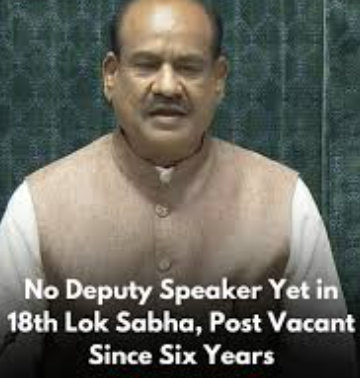Why No Deputy Speaker Since 2019?
Why No Deputy Speaker Since 2019?
Syllabus
GS 3: Indian Constitution
Why in the News?
Recently, the Deputy Speaker’s post has remained vacant since 2019. Even after the formation of the 18th Lok Sabha in 2024, the constitutionally mandated position continues to remain unfilled.
Introduction
- The Office of the Deputy Speaker of Lok Sabha is a vital constitutional post mandated under Article 93 of the Indian Constitution.
- It ensures the continuity, stability, and democratic balance of parliamentary proceedings.
- However, the recent neglect in appointing a Deputy Speaker has raised concerns about adherence to constitutional principles.
Constitutional Mandate of the Deputy Speaker
- Article 93 of the Constitution states that the Lok Sabha must choose a Speaker and a Deputy Speaker “as soon as may be.”
- The phrase “as soon as may be” conveys urgency, not discretion.
- The office of Deputy Speaker is not optional but is as crucial as that of the Speaker for the smooth functioning of Parliament.
- Article 94 clarifies that the Deputy Speaker stays in office until they resign, are removed, or cease to be a Member of Parliament.
- The Constitution intended the Lok Sabha to never function without a second-in-command to avoid leadership gaps.
Historical Background of the Office
- The post of Deputy Speaker has roots in India’s colonial era.
- It first appeared in the Central Legislative Assembly during British rule, initially called the Deputy President.
- Sachidanand Sinha was the first to occupy the position in 1921.
- By 1947, after independence, the Deputy Speaker had become an integral part of legislative practices.
- During the sessions of the Constituent Assembly (Legislative), the members decided to retain the position even before the Constitution was enacted in 1950.
- A. Ayyangar became the first elected Deputy Speaker of the Lok Sabha.
- After the death of Speaker V. Mavalankar in 1956, Ayyangar’s appointment as acting Speaker highlighted the necessity of having a Deputy Speaker ready to step in during emergencies.
Role and Responsibilities in Parliamentary Practice
- The Speaker cannot preside over every sitting due to the House’s extensive and prolonged sessions.
- As noted by constitutional expert S. Kashyap in Dada Saheb Mavalankar: Father of Lok Sabha, the Speaker’s workload necessitates the Deputy Speaker’s active role.
- The Deputy Speaker steps in during the Speaker’s absence, ensuring that the House proceedings continue without disruption.
- The Deputy Speaker presides over critical sessions, manages committees, and handles sensitive debates impartially.
- After election, the Deputy Speaker is expected to act neutrally, setting aside party loyalties.
- Beyond functionality, the position symbolizes bipartisan trust and respect.
Convention of Offering Post to Opposition
- A long-standing convention (though not mandatory) is to offer the Deputy Speaker’s post to the Opposition party.
- This practice enhances bipartisanship and fosters cross-party cooperation.
- Offering the position to the Opposition helps build trust and balance within Parliament.
- It strengthens the non-partisan nature of the Speaker and Deputy Speaker’s offices, reinforcing democratic values.
Growing Constitutional Vacuum
- The 17th Lok Sabha (2019–2024) completed its full term without electing a Deputy Speaker.
- The 18th Lok Sabha (elected after the 2024 general elections) has also not yet filled this position.
- This delay is not procedural; it is a serious constitutional anomaly.
- Never in India’s parliamentary history has the Deputy Speaker’s office remained vacant for such an extended period.
- Though Article 93 does not specify an exact deadline, “as soon as may be” cannot mean indefinite delay.
- The current situation raises grave concerns about the commitment to constitutional norms and democratic functioning.
Risks of Neglecting the Deputy Speaker’s Position
- An unfilled Deputy Speaker’s post removes an important institutional safeguard.
- It centralizes power solely within the Speaker and the ruling party.
- If the Speaker resigns, dies, or is removed, a lack of a designated second-in-command can lead to confusion and institutional paralysis.
- It indicates erosion of respect for parliamentary practices and constitutional mandates.
- Ignoring the convention of offering the post to the Opposition also damages the spirit of inclusive democracy.
- The neglect reflects a deeper trend of disregard for consensus politics and the need for institutional balance.
Arguments Against Delay
- Some argue that there is “no urgency” to appoint a Deputy Speaker.
- However, this contradicts the very ethos of the Constitutional democracy envisioned by the framers.
- Redundancy in leadership, like Deputy Speaker roles was consciously built into the system to ensure continuity, especially during crises.
- These constitutional positions were not considered optional or dispensable by the framers.
- Delay shows not just negligence but an active sidelining of democratic values and checks and balances.
Solutions to Address the Constitutional Gap
Introducing a Fixed Time Frame
- The Constitution could be amended to mandate a specific deadline (for example, within 60 days after the first sitting) for the election of the Deputy Speaker.
- This would prevent indefinite delays and protect parliamentary integrity.
Statutory or Procedural Reforms
- A statutory mechanism could authorize the President to initiate the process if Parliament fails to act within a reasonable time.
- The Speaker or Prime Minister could be made responsible for ensuring compliance within the timeline.
Restoring Trust through Reforms
- Appointing a Deputy Speaker promptly, preferably from the Opposition, would restore institutional credibility.
- It would help reverse the growing perception of partisanship in parliamentary functioning.
- In an era marked by increasing political polarization, such a gesture could strengthen democratic resilience.
- Proactively electing the Deputy Speaker would demonstrate the Parliament’s respect for constitutional mandates and a commitment to democratic balance.
Conclusion
- Deputy Speaker’s office is a constitutional necessity, not a ceremonial seat. Parliament must urgently reaffirm its commitment to constitutional norms by electing a Deputy Speaker, strengthening democratic values and institutional continuity in India.
Source: The Hindu
Mains Practice Question
Examine the constitutional and parliamentary significance of the Office of the Deputy Speaker of the Lok Sabha. What are the implications of its prolonged vacancy?





